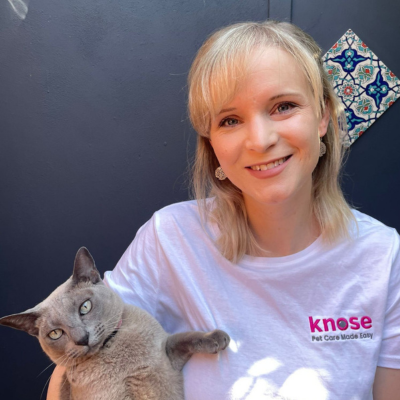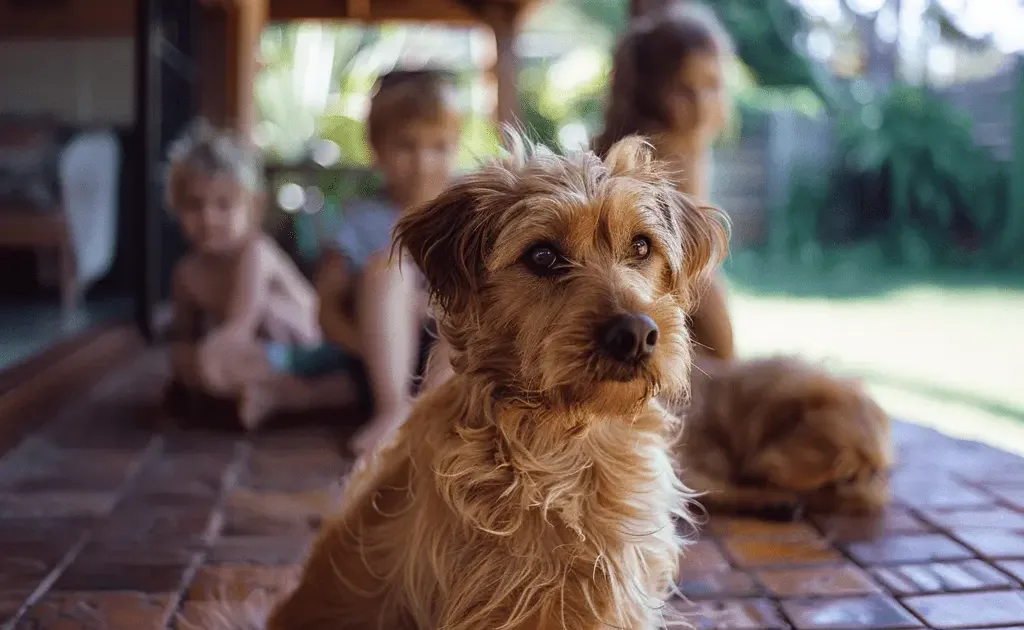Understanding how to care for senior pets is a deeply personal and often bittersweet experience. It requires love, patience, and the right knowledge to help our furry friends navigate through their golden years.
Dr. Amelia Bunker, a seasoned veterinarian, brings not only her professional expertise to this discussion but also heartfelt experiences in caring for her family’s own Tonkinese cat “Minky”, who is almost 20 years old. As a pet owner herself, she shares not only her invaluable insight to senior pet care but a vet’s genuine advice to help many more pet owners in this experience.
In this article, Dr. Amelia addresses the most frequently asked questions that many pet owners often wonder about how to care for senior pets.
General FAQs on senior pets
1. What age is a pet considered a senior?
Generally for older dogs they are considered senior when over seven years of age, however this can vary depending on the breed and size (e.g. generally larger breed dogs would be considered “senior” earlier than smaller breeds). For cats most people would consider a cat “senior” once it is around seven to ten years old.
2. What are common health problems in senior pets?
The most common health problems we see in senior pets would include dental diseases, joint and mobility issues such as arthritis, and changes to organ function such as kidney, liver, heart or endocrine conditions (such as hypothyroidism or diabetes).
3. How often should senior pets visit the vet?
There is no hard and fast rule regarding this as this may vary on your pets’ health, but most veterinarians would recommend a minimum of an annual health check (i.e. once a year as a minimum). For “Geriatric” pets this would increase to 6-monthly visits. Of course if any health conditions are identified your vet may recommend more frequent visits.
Minky, my senior cat, receives regular acupuncture for her arthritis, regular vet checks and dental treatments, and weekly subcutaneous fluids for her chronic kidney condition and is still going strong.
Diet, nutrition, and health
4. What nutritional changes are needed for senior pets?
You may have noticed that some pet food brands have different foods available for different age groups (e.g puppies vs older dogs). This is because our pets have different needs based on their growth and activity levels.
Generally speaking senior pets have a lower metabolic rate and may be less active, so they often require less direct calories than a more active or younger or growing pet.
Despite this, it is very important to focus on quality food. For instance, the quality of protein for cats is particularly important as senior cats age. If you are caring for senior cats, you also have to understand that this means their requirement for vitamins, minerals, antioxidants and fibre can also change.
Ensuring your pet always has access to plenty of fresh water is vital, and changes to water intake can be a very important sign of health changes too. Learning the basics of diet and nutrition is a good way for pet owners like us to learn how to care for senior pets.
5. How can I tell if my senior pet is experiencing age-related health issues?
The best way to detect changes early is by ensuring minimum annual check-ups with your veterinarian (or even more frequent for more senior pets). This can help detect subtle changes or changes you would not be able to see at home such as heart diseases.
Often pet owners may notice their pet getting “slower” or “stiff” as they age. These are often indicators of conditions such as arthritis for which there are so many veterinary treatment options now available to help keep your pet comfortable.
Other changes you may notice include changes to their appetite or thirst (e.g. excessive drinking can be an indicator of kidney disease), changes to weight (increase or decrease) or other behaviour changes (such as sleeping more, reduced reaction to noise or sight) or finally lumps or bumps.
6. Does my senior pet still need regular preventive care?
Generally yes, however your local veterinarian should be able to advise which preventative measures are appropriate for your pet. For example, if you live in a tick-prone region in Australia it would be very important to continue tick prevention steps. What this looks like for you and your pet may differ depending on your circumstances.
It’s also important to remember that generally as pets reach their senior years their immune system can be more susceptible to infections and other conditions. If you are starting to learn how to care for senior pets, preventive care should be one of the top in your list.
7. What are the signs of pain or discomfort in senior pets, and how can they be managed?
Management of these would vary depending on the underlying cause. Check with your local veterinarian for treatment and steps. General signs of pain or discomfort can include:
- Lethargy or just being “not quite right”
- Reduced appetite
- Stiffness / limping / slowness rising
- Reluctance to go on walks or stopping mid-walk / reduced exercise tolerance
- It is worth noting that dental conditions and oral pain can be very well masked by our pets – often the first obvious sign to owners is smelly breath, but some pets will be hesitant to eat certain foods, or chew on one side for example
8. Are there any specific supplements or medications recommended for senior pets?
Your veterinarian can advise you based on your pets needs if there are any recommended supplements or medications. This can vary depending on whether your pet has any illnesses for example that mean certain products should be avoided.
Commonly recommended supplements for older pets would include supplements for joint or cartilage health, in some instances probiotics or other supplements may be recommended.
What pet owners can do
9. What can I do at home to support my senior pet’s health?
Ensure complete regular veterinary health checks and dental checks with a registered veterinarian. Animals are very clever at “hiding” things if they are unwell or uncomfortable.
Aside from this, a good quality diet— regular, but appropriate exercises for your pet are great things you can do to support your pet. More senior pets may also need some extra support with grooming and hygiene (e.g. gentle brushing or more regular bathing).
As pets become more senior we can make changes around the home. For example, you have to ensure your senior cats do not have to jump up and down from great heights to navigate around the home. Be the one to carry and transport them around places. Make sure they have comfortable bedding and other accessible measures in place such as non-slip surfaces and ramps if possible. Most importantly, be aware of where your pets are at all times. Setting up CCTV to track them especially at night will be really helpful to not allow them to wander off.
10. How should exercise routines be adjusted for senior pets?
Generally senior pets would require adjustments in the form of shorter exercise periods and less “strenuous” activities. For most senior pets two smaller walks a day would be better than one very long or arduous walk. You may also have to adjust what your pet does with you— e.g. some senior pets may no longer be suitable for jogging or running, but instead would do better for walking or swimming.
11. How do I cope with a terminally ill senior pet?
Learning how to care for senior pets mean that we, as pet owners, are bound to this situation. This can be a really challenging and difficult time. Discuss your circumstances with your veterinarian, as it is really important they are informed of everything when formulating a treatment plan and recommendations for your terminally ill senior pet. If it is really difficult to give your dog tablets or other medication, then this needs to be factored in so that your vet can help look at other alternatives for you.
Have a plan for afterhours in advance. Find options with a 24/7 vet clinic you can call or visit if your pet becomes unwell and your regular vet is closed.
Spending quality time with your loved pet and making memories together can be really helpful. Be as open and honest with your family and support network as possible. It’s also important to reach out for support if you or anyone you know is struggling. Hotlines like Griefline (1300 845 745) and Pets and People (1300 431 450) offer support and guidance during this time, ensuring you are not alone with your thoughts.
12. How do I know when it’s time to consider euthanasia for my pet?
Again this can be a really challenging decision, and there is no “right” answer. Your veterinarian can work with you closely.
For a lot of us pet owners, the decision may come down to a lot of factors (e.g. quality of life, emotional, mental, and physical needs) as well as an element of practical decision-making. As much as we do not like to think of it, finances can be an influencing factor as well.
For those whose pets at the end of life, we at Knose, have a guide to help you navigate coping with pet loss and how to deal with immediate aftercare.
13. What is a quality-of-life scale and how can it help me make end-of-life decisions?
There are a few different “scales” for measuring a pet’s quality of life. However, these can still be hard to use or interpret. They may take out some of the challenging aspects of making decisions. One scale for example is the HHHHHMM scale, which looks at factors like Hurt, Hunger, Hydration, Hygiene, Happiness, Mobility and More Good Days Than Bad.
For some people using scales or metrics like these can be useful in coming up with criteria to help with making end-of-life decisions.
14. What financial considerations should I keep in mind when caring for senior pets?
Generally speaking as our pets enter seniorhood, there is a higher likelihood of them developing chronic health conditions, which can be expensive to manage (for example this may require certain medications, regular veterinary care or certain foods). Additionally other expenses such as merchandise (blankets or coats for older pets may be necessary in cooler areas for example), or increased costs for grooming or other care may emerge.

Dr. Amelia, our head veterinarian at Knose, is also a fur parent to an 8-year old, Olive, and 20-year old, Minky, who are both Tonkinese cats. Minky has a chronic kidney condition. Dr. Amelia makes sure she receives regular acupuncture for her arthritis, regular vet checks, dental treatments. As a vet and pet owner, learning how to care for senior pets is a long journey. While looking after other pets, she is comfortable knowing her cats are both healthy and strong.
Stay tuned for more tips and advice from Dr. Amelia on pet health and wellbeing.



